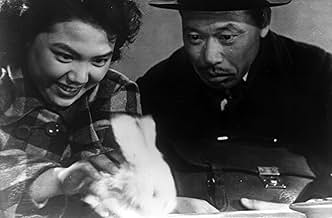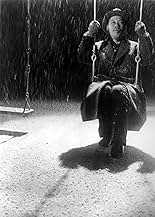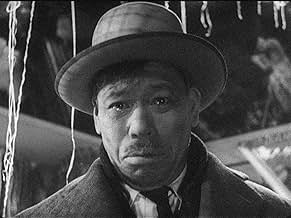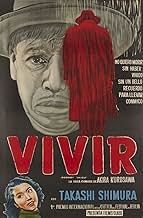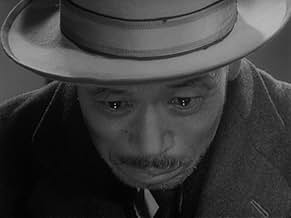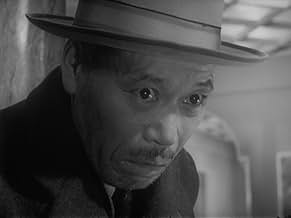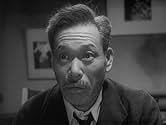Ein Bürokrat versucht in seinem Leben einen Sinn zu finden, nachdem er erfahren hat, Krebs im Endstadium zu haben.Ein Bürokrat versucht in seinem Leben einen Sinn zu finden, nachdem er erfahren hat, Krebs im Endstadium zu haben.Ein Bürokrat versucht in seinem Leben einen Sinn zu finden, nachdem er erfahren hat, Krebs im Endstadium zu haben.
- Nominiert für 1 BAFTA Award
- 6 Gewinne & 2 Nominierungen insgesamt
Handlung
WUSSTEST DU SCHON:
- WissenswertesWhen Takashi Shimura rehearsed his singing of "Song of the Gondola," director Akira Kurosawa instructed him to "sing the song as if you are a stranger in a world where nobody believes you exist."
- PatzerWhen Kanji and the Novelist go to a busy, loud nightclub, the film has been reversed as evidenced by the backwards "Nippon Beer" banner in the background.
- VerbindungenFeatured in The Siskel & Ebert 500th Anniversary Special (1989)
- SoundtracksJ'ai Deux Amours
(uncredited)
Music by Vincent Scotto
Lyrics by Georges Koger and Henri Varna
Performed by Josephine Baker
[Played when entering the bar with the long-faced man]
Ausgewählte Rezension
Ikiru is a film about life. Constantly complex and thought-provoking, although simple at the same time; it tells a story about life's limits, how we perceive life and the fact that life is short and not to be wasted. Our hero is Kanji Watanabe, the most unlikely 'hero' of all time. He works in a dreary city office, where nothing happens and it's all very meaningless. Watanabe is particularly boring, which has lead to him being nicknamed 'The Mummy' by a fellow worker. He later learns that he is dying from stomach cancer and that he only has six months to live. But Watanabe has been dead for thirty years, and now that he's learned that his life has a limit; it's time for Watanabe to escape his dreary life and finally start living. What follows is probably the most thoughtful analysis of life ever filmed.
Ikiru marks a departure for Akira Kurosawa, a man better known for his samurai films, but it's a welcome departure in my opinion. Kurosawa constantly refers to Watanabe as 'our hero' throughout the film, and at first this struck me as rather odd because, as I've mentioned, he's probably the least likely hero that Kurosawa has ever directed; but that's just it! This man is not a superhero samurai, but rather an ordinary guy that decides he doesn't want to be useless anymore. That's why he's 'our hero'. Kurosawa makes us feel for the character every moment he's on screen - we're sorry that he's wasted his life, and we're sorry that his wasted life is about to be cruelly cut short. However, despite the bleak and miserable facade that this movie gives out, there is a distinct beauty about it that shines through. The beauty emits from the way that Watanabe tries to redeem his life; because we feel for him and are with him every step of the way, it's easy to see why Watanabe acts in the way he does. Ikiru is a psychologically beautiful film.
It could be said that the fantastic first hour and a half is let down by a more politically based final third - and this is true. The movie needs it's final third in order to finish telling the story, but it really doesn't work as well as the earlier parts did. However, Kurosawa still delights us with some brilliant imagery and the shot of Watanabe on a swing is the most poetically brilliant thing that Kurosawa ever filmed. Together with the music and the rest of the film that you've seen so far; that picture that Kurosawa gives us is as moving as it is brilliant.
Ikiru marks a departure for Akira Kurosawa, a man better known for his samurai films, but it's a welcome departure in my opinion. Kurosawa constantly refers to Watanabe as 'our hero' throughout the film, and at first this struck me as rather odd because, as I've mentioned, he's probably the least likely hero that Kurosawa has ever directed; but that's just it! This man is not a superhero samurai, but rather an ordinary guy that decides he doesn't want to be useless anymore. That's why he's 'our hero'. Kurosawa makes us feel for the character every moment he's on screen - we're sorry that he's wasted his life, and we're sorry that his wasted life is about to be cruelly cut short. However, despite the bleak and miserable facade that this movie gives out, there is a distinct beauty about it that shines through. The beauty emits from the way that Watanabe tries to redeem his life; because we feel for him and are with him every step of the way, it's easy to see why Watanabe acts in the way he does. Ikiru is a psychologically beautiful film.
It could be said that the fantastic first hour and a half is let down by a more politically based final third - and this is true. The movie needs it's final third in order to finish telling the story, but it really doesn't work as well as the earlier parts did. However, Kurosawa still delights us with some brilliant imagery and the shot of Watanabe on a swing is the most poetically brilliant thing that Kurosawa ever filmed. Together with the music and the rest of the film that you've seen so far; that picture that Kurosawa gives us is as moving as it is brilliant.
Top-Auswahl
Melde dich zum Bewerten an und greife auf die Watchlist für personalisierte Empfehlungen zu.
Details
Box Office
- Bruttoertrag in den USA und Kanada
- 60.239 $
- Eröffnungswochenende in den USA und in Kanada
- 2.149 $
- 29. Dez. 2002
- Weltweiter Bruttoertrag
- 113.821 $
- Laufzeit2 Stunden 23 Minuten
- Farbe
- Sound-Mix
- Seitenverhältnis
- 1.37 : 1
Zu dieser Seite beitragen
Bearbeitung vorschlagen oder fehlenden Inhalt hinzufügen

Oberste Lücke
What is the streaming release date of Ikiru: Einmal wirklich leben (1952) in Australia?
Antwort
![Trailer [OV] ansehen](https://m.media-amazon.com/images/M/MV5BMTg4OWJkNjMtM2Y0Mi00MzQ5LTk3Y2YtZWMwNGUyOTIyNGVjXkEyXkFqcGdeQXRyYW5zY29kZS13b3JrZmxvdw@@._V1_QL75_UX500_CR0)
